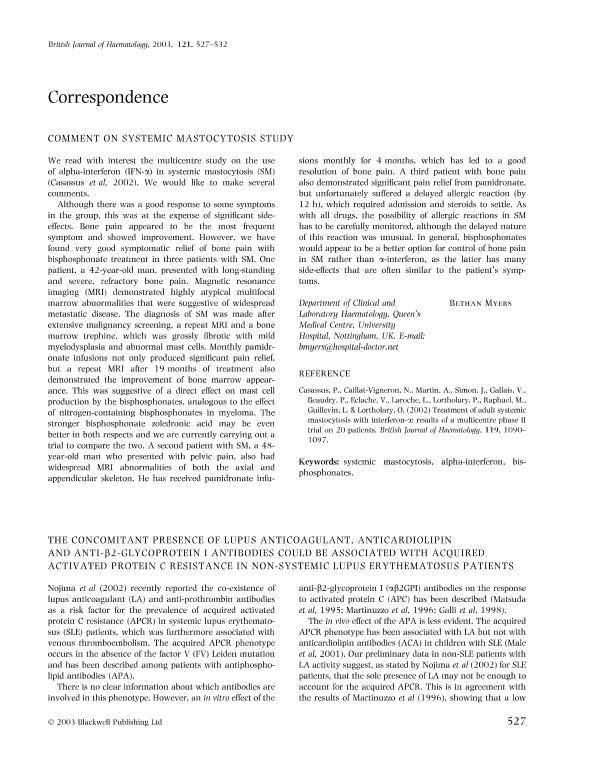Artículo
The concomitant presence of lupus anticoagulant, anticardiolipin and anti-β2-glycoprotein I antibodies could be associated with acquired activated protein c resistance in non-systemic lupus erythematosus patients
Fecha de publicación:
05/2003
Editorial:
Wiley Blackwell Publishing, Inc
Revista:
British Journal of Haematology
ISSN:
0007-1048
Idioma:
Inglés
Tipo de recurso:
Artículo publicado
Clasificación temática:
Resumen
Nojima et al (2002) recently reported the co-existence of lupus anticoagulant (LA) and anti-prothrombin antibodies as a risk factor for the prevalence of acquired activated protein C resistance (APCR) in systemic lupus erythematosus (SLE) patients, which was furthermore associated with venous thromboembolism. The acquired APCR phenotype occurs in the absence of the factor V (FV) Leiden mutationand has been described among patients with antiphospholipid antibodies (APA).There is no clear information about which antibodies are involved in this phenotype. However, an in vitro effect of theanti-b2-glycoprotein I (ab2GPI) antibodies on the response to activated protein C (APC) has been described (Matsuda et al, 1995; Martinuzzo et al, 1996; Galli et al, 1998).We evaluated whether the presence of ACA immunoglobulin (Ig)G and ab2GPI IgG was associated with acquired APCR in 24 LA patients with primary antiphospholipid syndrome.
Archivos asociados
Licencia
Identificadores
Colecciones
Articulos(IMEX)
Articulos de INST.DE MEDICINA EXPERIMENTAL
Articulos de INST.DE MEDICINA EXPERIMENTAL
Citación
Gennari, Laura; Blanco, Alicia; Alberto, Maria Fabiana; Grosso, Silvia; Lazzari, María Ángela; The concomitant presence of lupus anticoagulant, anticardiolipin and anti-β2-glycoprotein I antibodies could be associated with acquired activated protein c resistance in non-systemic lupus erythematosus patients; Wiley Blackwell Publishing, Inc; British Journal of Haematology; 121; 3; 5-2003; 527-529
Compartir
Altmétricas




